#jewish resistance fighters
Text

Faye Schulman in a forest in Poland, c. 1943/1944.
Schulman (born Faigel Lazebnik; November 28, 1919 – April 24, 2021) was a Jewish partisan, photographer, Holocaust survivor, and brigade member. She is widely considered to be the only Jewish partisan photographer who was able to capture the struggle Jews went through during World War II.
From 1942 to 1945, she took over 100 haunting photographs of the Holocaust and resistance fighters — even being forced by the Nazis to take one of massacred Jews, which among the victims included her parents and siblings. After this occurrence, she was determined to document the atrocities that the Germans inflicted, and later on was able to use these photos against them.
After the war ended in 1945, Schulman immigrated to Canada with her husband; released a memoir; was decorated by the Soviet/Belarusian, American, and Canadian governments; and lived another 76 years, peacefully dying at the age of 101.
"I want people to know that there was resistance. Jews did not go like sheep to the slaughter. I was a photographer. I have pictures. I have proof." – Faye Schulman.
#1940s#*#jewish#female photographers#women in history#faye schulman#partisan#jewish history#old photos#historic photographs#world war ii#resistance fighters#world war 2#40s#world war two#women in photography#history#women of history#jews of tumblr#jews#old photography#history photos#vintage#vintage photography#vintage photos#women photographers#black and white#b&w#photography#photographers
66 notes
·
View notes
Text
youtube
Holocaust Survivor's POWERFUL Message to Gaza Protesters
"If you are just indifferent, if you don't take a stand, you acquire a degree of guilt without any doubt; and I think it is imperative to assert opposition even at some degree of disadvantage and risk if you want to be guilt free when history judges what's happening. "
#palestine#free palestine#gaza#genocide#freedom of speech#protests#freedom fighters#jewish antizionism#college protests#resistance#boycott divest sanction#divestment#holocaust
11 notes
·
View notes
Text
Looking through the biographies of FIA presidents pre-Jean Todt and except for Wilfred Andrews, they usually fall into one of these categories:
Insanely rich nobleman (probably did politics)
Insanely rich nobleman who were a resistance fighter
Insanely rich nobleman who were a resistance fighter and worked for the Nazis
Resistance fighter who worked for the Nazis
Nazi
#the fact that jean todt have jewish parents who escaped poland and the fucker before him was like. a raging nazi#anyway the resistance fighter who worked for nazis is balestre btw. insane ha ?#history course brought to you by me being bored in class#effw.
11 notes
·
View notes
Text
#jumblr#jewish#jews#nesyapost#jewish history#ww2#ww2 women#Jewish women#resistance fighters#history#tiktok
20 notes
·
View notes
Photo
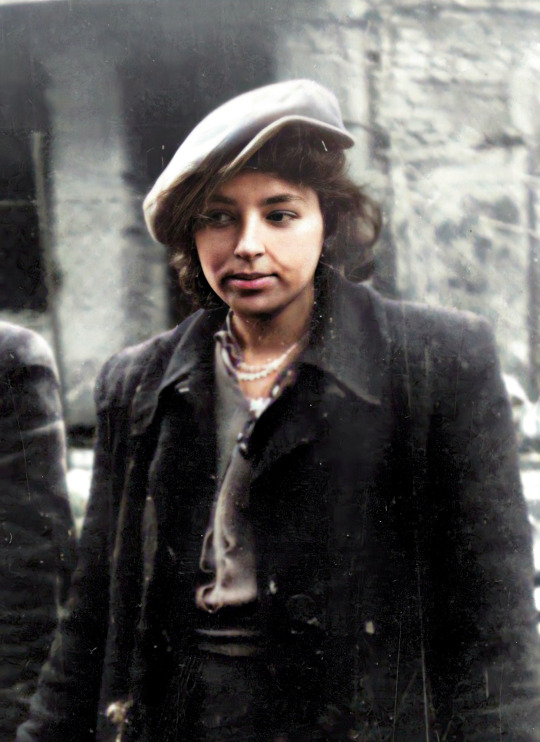
7 notes
·
View notes
Text
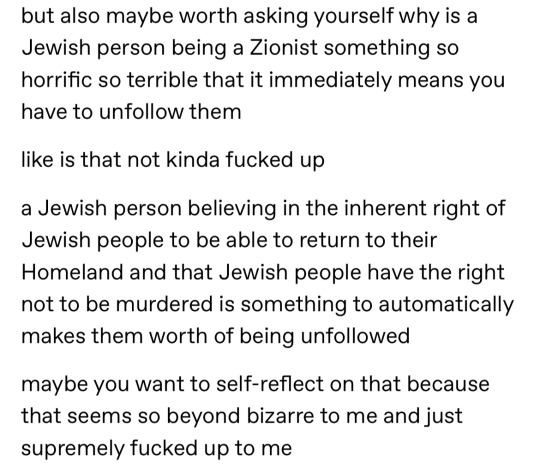
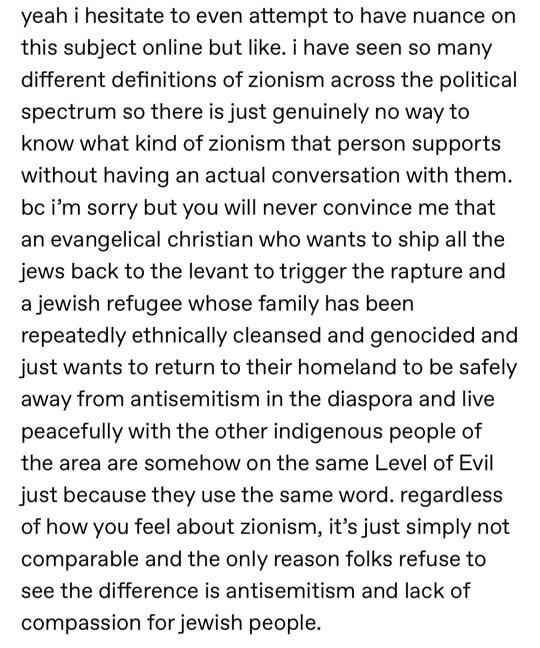
Saw this post floating around, don’t wanna target anyone or argue with Zionists, but it is my duty (especially as an actually indigenous Jew) to educate well-meaning gentiles who might see this and think they have no right to speak on the matter. I’ll go point by point.
1) “Is it so terrible for a Jew to be a Zionist?”
If we were living in any other era, where the genocidal crimes of Israel were not as widely known (though they were very well documented), you could perhaps ask this question in sincerity. Many Jews (such as myself) grow up in religious educational settings which either fail to mention the human rights violations of the state or claim they’re justified because “they want to kill us!” Past a certain point, though, one can’t continue to claim ignorance of what Zionism actually does. Short answer: yes, it is terrible for anyone to claim to be a Zionist, but this will be more evident as I continue to analyze these arguments.
2) “Zionism is the belief in the inherent right of the Jewish people to return to their homeland”
First of all, Palestine is not the “homeland” of the Jewish people any more than Siberia is the homeland of indigenous american tribes. Is there a historical connection? Yes, but though assimilation and migration Jews have found homes across the world. For me, my homeland is Mexico, because my family has lived there for generations, partly through migration but mostly through having cultivated the land for millennia. Even biblically speaking, Palestine does not “belong” to the Jewish people, it belongs to G-d. Furthermore, there is no shortage of Jewish scholarship and activism that asserts that wherever we live, that is our homeland. Frankly, I’m more interested in fighting to stay where I am than fighting to force people out of their homes to accommodate me.
3) “Zionism is the belief in the Jewish right not to be murdered”
By murdering others instead? Once again, there is no shortage of Jewish scholarship and activism in favor of Jewish self defense where we live. Jewish resistance fighters lived and died fighting the nazis in Europe under the third reich. If Zionism was actually interested in preventing Jewish death, it would fight antisemitism where it is. “Preventing murder” is not an excuse to commit genocide.
4) “there are so many definitions of Zionism”
Sorry but I just think of this tweet from @jewdas on Twitter when I read this: “There’s a actual existing Zionism which practices apartheid and denial of human rights. But there’s another Zionism inside my head which is all rainbows and kosher marshmallows, so who can say which is the real Zionism?” In other words, the actual, material consequences of Zionist beliefs are more important than what any individual thinks their Zionism is. Once again, we live in the Information Age, where anyone can easily learn about the damage that Zionism has done in Palestine and abroad. There is no excuse to continue using the label that doesn’t presuppose complete ignorance of Israeli violence.
5) “zionists just want to be safe from antisemitism in the diaspora”
See points 3 & 4.
6) “and this is different from evangelical zionists”
Materially speaking, not really. Once again, see point 4. Until you pull all US/european colonial support for Israel, this claim falls flat.
7) “zionists just want to live peacefully with other indigenous people in the area”
That’s not what indigeneity is, it doesn’t mean “from there,” it’s a specific relationship to the land and to its cultivation. (On a side note, even biblically and historically speaking, Jews are not “from” Palestine.) See point 2. Zionism has proven it is not a peaceful ideology. See point 4.
8) “people refuse to see the difference in types of Zionism because they hate the Jews”
No, it’s because there are no material differences. See point 4. Evangelical Zionism and Jewish Zionism actually share quite a bit in common. The “Jewish state” would not exist without evangelical Zionists. See point 6. And the original Jewish Zionist thinkers had a vested interest in tying the two together.
tl;dr, Zionism is a violent ideology in practice, and no amount of making excuses can hide the fact that it is genocidal and serves European/American interests. Additionally, just because one is not Jewish does not mean one does not have a duty and an obligation to eliminate Zionism wherever it crops up. Zionism has had disastrous consequences for Palestinians, and as western citizens, we benefit from their suffering. It must end now. May Palestine be freed in our lifetimes.
15K notes
·
View notes
Text
Extract from Refaat Alareer's course on English poetry in 2019:
"Of course we always fall into this trap of saying, 'she [Fadwa Tuqan] was arrested for just writing poetry!' We do this a lot, even us believers in literature. [We say] 'Why would Israel arrest somebody or put someone under house arrest, she only wrote a poem?' So we contradict ourselves sometimes; we believe in the power of literature changing lives, as a means of resistance, as a means of fighting back, and then at the end of the day, we say 'She just wrote a poem!' We shouldn't be saying that. Moshe Dayan, an Israeli general, said that 'The poems of Fadwa Tuqan are like facing 20 enemy fighters.' Wow. She didn't throw stones, she didn't shoot at the invading Israeli jeeps, she just wrote poetry. And I'm falling for that again—I said she just wrote poetry.
And the same thing happened to Palestinian poet Dareen Tatour. She wrote poetry, celebrating Palestinians' struggle, encouraging Palestinians to resist, not to give up, to fight back— She was put under house arrest, she was put into prison for years. And therefore, I end here, with a very significant point: Don't forget that Palestine was first and foremost occupied in Zionist literature and Zionist poetry.
When the Zionists thought of going back to Palestine, it wasn't like 'Oh, let's go to Palestine.' It took them years, over 50 years of thinking, of planning, politics, money and everything else. But literature played one of the most crucial roles here.
Palestine in Zionist Jewish literature was presented to Jewish people around the world... [as] Palestine is a land without a people for a people without a land. Palestine flows with milk and honey. There is no one there—so let's go. [but] there were people—there have always been people in Palestine. But this is an example of how poetry can be a very significant part of life." [13:05-14:40]
credits to @/protosemite on X for the transcription.
Prof Refaat Alareer was killed by an israeli airstrike that targeted his house 2 days ago.
2K notes
·
View notes
Text
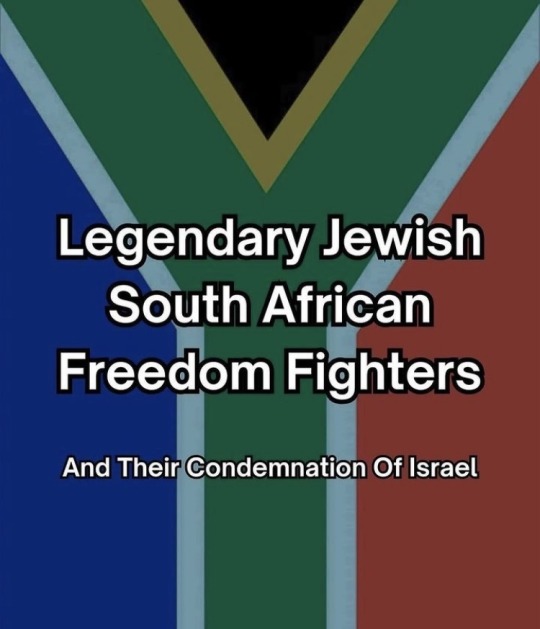
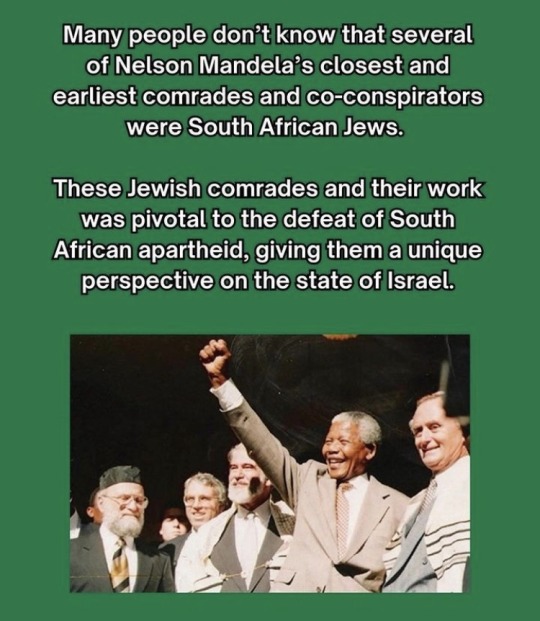
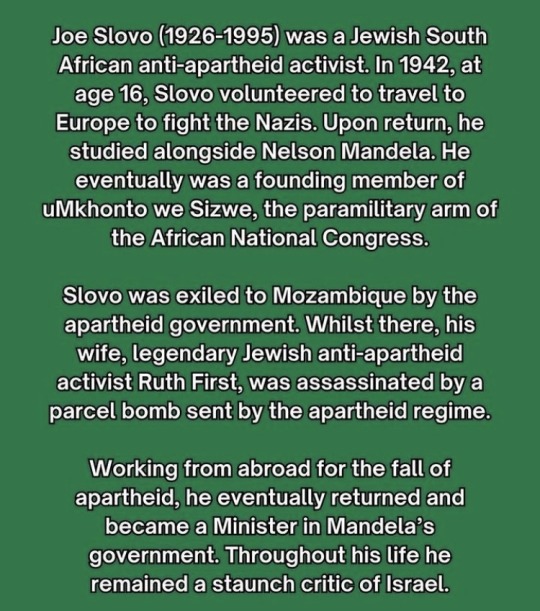
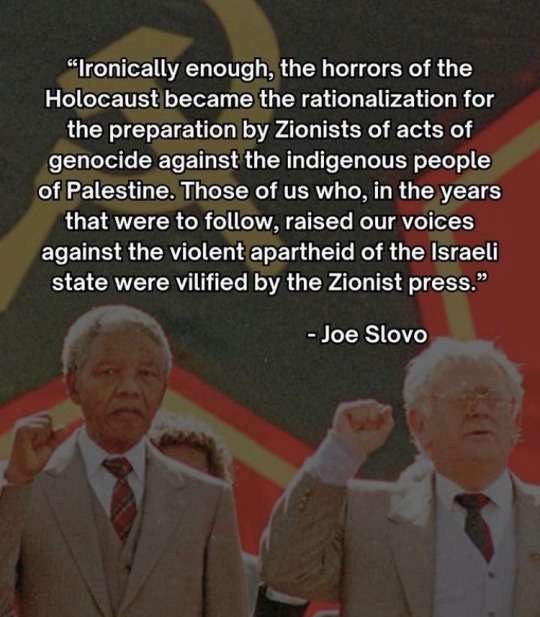
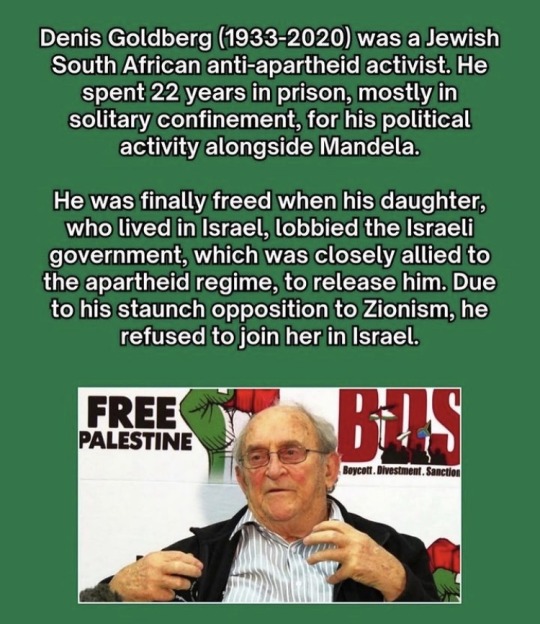
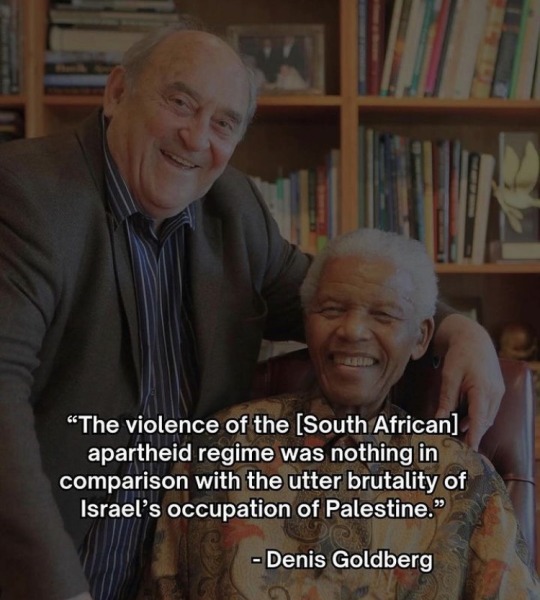
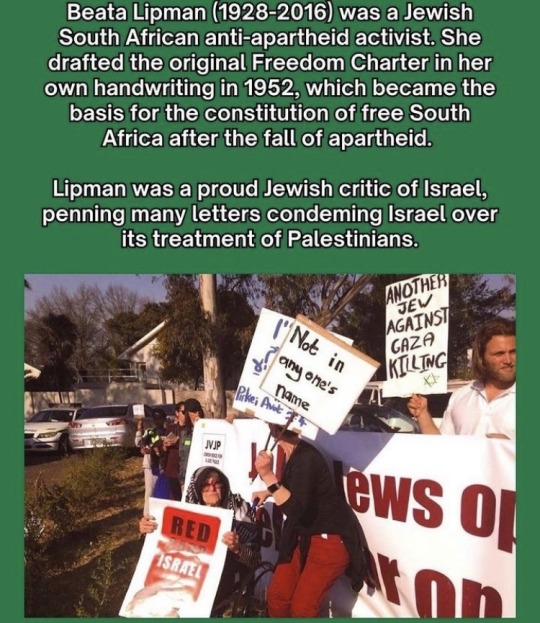
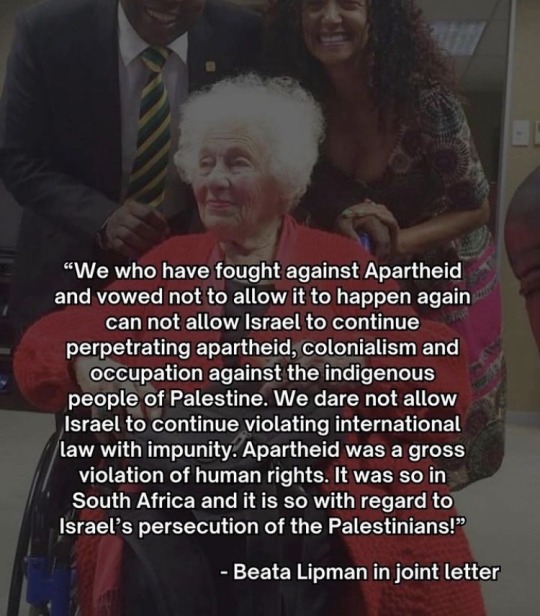
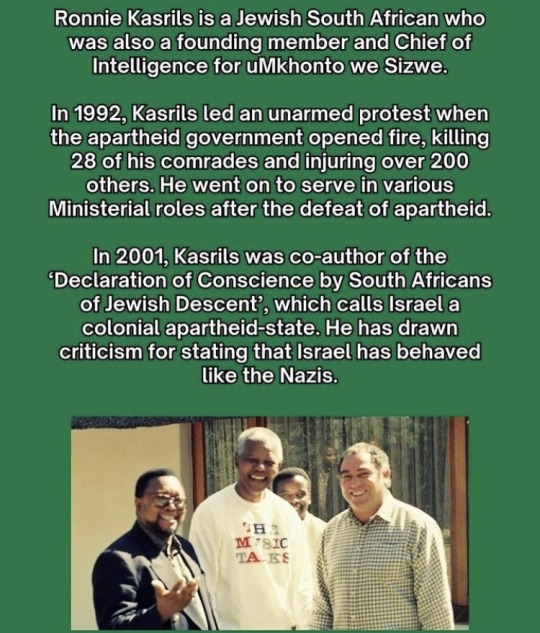
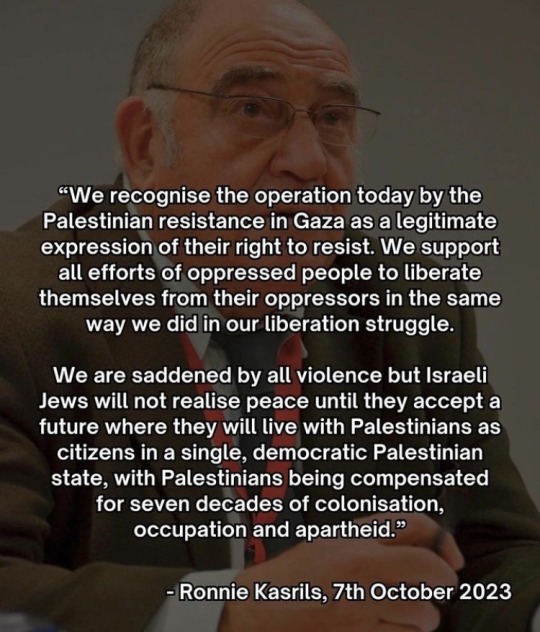
Image transcriptions below:
Legendary South African Jewish Freedom Fighters
And Their Condemnation of Israel
Many people don't know that several of Nelson Mandela's closest and earliest comrades and co-conspirators were South African Jews.
These Jewish comrades and their work was pivotal to the defeat of South African apartheid, giving them a unique perspective on the state of Israel.
—
Joe Slovo (1926-1995) was a Jewish South African anti-apartheid activist. In 1942, at age 16, Slovo volunteered to travel to Europe to fight the Nazis. Upon return, he studied alongside Nelson Mandela. He eventually was a founding member of uMkhonto we Sizwe, the paramilitary arm of the African National Congress.
Slovo was exiled to Mozambique by the apartheid government. Whilst there, his wife, legendary Jewish anti-apartheid activist Ruth First, was assassinated by a parcel bomb sent by the apartheid regime.
Working from abroad for the fall of apartheid, he eventually returned and became a Minister in Mandela's government. Throughout his life he remained a staunch critic of Israel.
—
"Ironically enough, the horrors of the Holocaust became the rationalization for the preparation by Zionists of acts of genocide against the indigenous people of Palestine. Those of us who, in the years that were to follow, raised our voices against the violent apartheid of the Israeli state were vilified by the Zionist press."
- Joe Slovo
—-
Denis Goldberg (1933-2020) was a Jewish South African anti-apartheid activist. He spent 22 years in prison, mostly in solitary confinement, for his political activity alongside Mandela.
He was finally freed when his daughter, who lived in Israel, lobbied the Israeli government, which was closely allied to the apartheid regime, to release him. Due to his staunch opposition to Zionism, he refused to join her in Israel.
—
"The violence of the [South African] apartheid regime was nothing in comparison with the utter brutality of Israel's occupation of Palestine."
- Denis Goldberg
—
Beata Lipman (1928-2016) was a Jewish South African anti-apartheid activist. She drafted the original Freedom Charter in her own handwriting in 1952, which became the basis for the constitution of free South Africa after the fall of apartheid.
Lipman was a proud Jewish critic of Israel, penning many letters condeming Israel over its treatment of Palestinians.
—
"We who have fought against Apartheid and vowed not to allow it to happen again can not allow Israel to continue perpetrating apartheid, colonialism and occupation against the indigenous people of Palestine. We dare not allow Israel to continue violating international law with impunity. Apartheid was a gross violation of human rights. It was so in South Africa and it is so with regard to Israel's persecution of the Palestinians!"
- Beata Lipman in joint letter
—
Ronnie Kasrils is a Jewish South African who was also a founding member and Chief of Intelligence for uMkhonto we Sizwe.
In 1992, Kasrils led an unarmed protest when the apartheid government opened fire, killing 28 of his comrades and injuring over 200 others. He went on to serve in various Ministerial roles after the defeat of apartheid.
In 2001, Kasrils was co-author of the
*Declaration of Conscience by South Africans of Jewish Descent, which calls Israel a colonial apartheid-state. He has drawn criticism for stating that Israel has behaved like the Nazis.
—
"We recognise the operation today by the Palestinian resistance in Gaza as a legitimate expression of their right to resist. We support all efforts of oppressed people to liberate themselves from their oppressors in the same way we did in our liberation struggle.
We are saddened by all violence but Israeli Jews will not realise peace until they accept a future where they will live with Palestinians as citizens in a single, democratic Palestinian state, with Palestinians being compensated for seven decades of colonisation, occupation and apartheid."
- Ronnie Kasrils, 7th October 2023
#free palestine#palestine#gaza#hamas#israel#fuck israel#freedom fighters#resistance#south africa#israel is an apartheid state#apartheid#genocide#from the river to the sea palestine will be free
2K notes
·
View notes
Text
Today is the 81st anniversary of the Warsaw Ghetto Uprising!!
I still remember that day in grad school when I learned about this lady named Vladka Meed, who smuggled explosives into the Ghetto in preparation for the Uprising.
That is my origin story. Learning the deep involvement of women at every level of the Uprising, from armaments to command (enter: Queen Zivia) changed my life, as a Jewish woman, and as a historian, forever. And I'm so SO honored that I get to play a role in ensuring that they take their rightful place in our collective memory.*
Remember, US readers, whenever anyone tells you that the Jews "should have resisted," that "if the Jews had guns more could have been saved," remember, that the Jews DID resist. They DID have guns. And most of the Jews who rose up and fought?--expected to die. The Warsaw Ghetto fighters didn't start the Uprising out of some silly dream that they could "beat" the Nazis, they rose up to make a statement about the dignity of the Jewish people.
As a sidenote, many of the best scholarly treatments of Jewish resistance during the Holocaust have been out of print since the 1970s.
*My first book, The Girl Bandits of the Warsaw Ghetto, is set to be released in Fall 2025.
251 notes
·
View notes
Note
hey sal feel free to ignore this but i got into an argument with a zionist who claimed that arabs sold their lands to them, is this true
This is interesting, because it ignores a lot of context. Keywords to remember is the Ottoman capitulation, the Felaheen, the Sursock purchase and the eviction of Palestinians that inhabited the area at that time.
The Sursock family was a family of Aristocratic landlords with strong ties to the Turkish and European nobility dating back to the 19th century. The Sursocks were known to have mass purchased land in Palestine from the Ottoman Turks. While they were absentee landlords, they hired Arab labours who inhabited the purchased land at that time. When the Turks capitulated following WW1, the Turks were pressured into allowing the land to be sold to the PLDC, the Palestinan (later Israeli) Land Development Company. The PLDC sought to purchase the Jezreel valley, which consisted of 20-25 Arab villages, from the Sursock. . Keep in mind that the Jezreel valley was the most fertile land of Palestine and close to the economic city of Haifa. Following the mass purchase of land by the PLDC, the Jewish landbuyers expelled Arab tenants and depopulated the Arab villages despite their usufruct, and right to toll on the land. This all came as a surprise to the Arab inhabitants. This was all part of the idea that cheap Arab labour should be replaced with Jewish labour, this despite the fact that Arab labourers had greater expertise on the agricultural field; the settlers were unfamiliar with the land. Keep in mind that according to JNF, the Jewish national fund, only 3% of the Palestinian land were uncultivated, destroying the myth that the land bloomed as a result of its settler colonizers. The Hashomer Hatzaeer would come to be the center of these kibbutzim and would establish over 30 kibbutzim built ontop of the Arab villages before 1948. As a result, the Arabs, or Felaheen (The Arab peasant class) put up a resistance against the JNF out of concrete material reasons and attempted to fight back against the expansion of these kibbutzim. This was the first instance of Arab resistance against Zionism.
All of these lands were purchased before 1948 and the Arabs were expelled and depopulated only for the kibbutzim to be established with the help of the money provided by the Jewish Colonization association and its organs. However, the British mandate did not require the landowners to compensate for the expelled Arab tenants. The Arabs were forced to migrate to slums and towns. In one of these towns, a notable Syrian resistance fighter would rise up, namely, Izz ad-Din al-Qassam, and declare jihad on the British. When the Arabs resisted their dispossession by every means necessary, even violence, the Zionists used this as an excuse to fortify their colonizers and expand them due to "escalating security needs". Since the colonizers were too weak to face the resistance, they turned themselves to the British to gain their support in an attempt to expand their lands as means of security for the Kibbutzim. In a memondarium written by the Kibbutz Hazora (a settlement in Jezreel) to the Jewish Agency in 1936: "Our basic demand is for our own instutions to help us ugently in getting the British authorities to expand our territory--this is a vital issue for us.". A similar pretext is used whenever the colonized put up resistance against their colonizers, in which the same excuse is used to further expand and colonize the lands. This is the logic of the oppressor in any context, whether it is colonial or in the class struggle.
317 notes
·
View notes
Text
80th Anniversary of the Warsaw Ghetto Uprising: "The World Has to Know That We Did Not Go Like Lambs to the Slaughter."
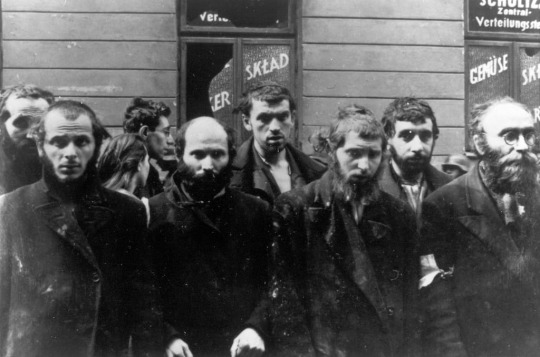
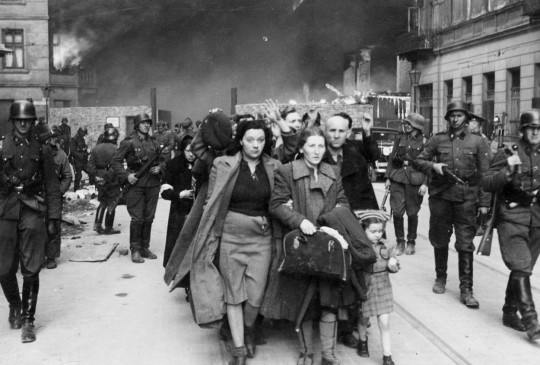

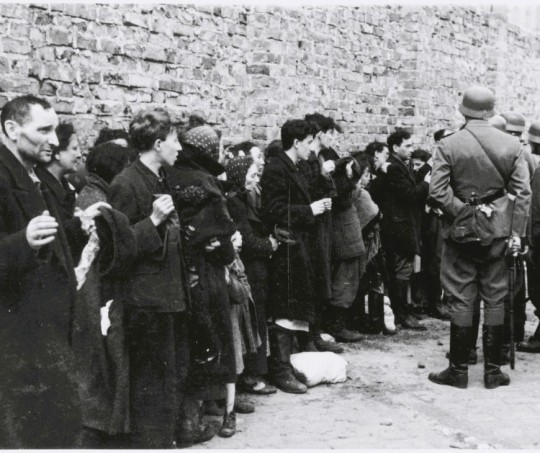
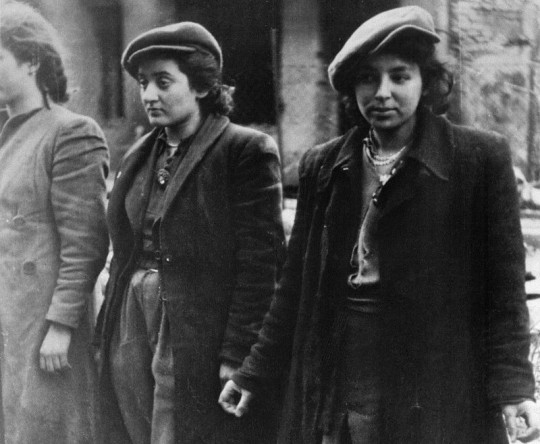
April 19th, 1943 - May 16th, 1943
Warsaw, Poland
“The question is not why all the Jews did not fight, but how so many of them did. Tormented, beaten, starved, where did they find the strength, spiritual and physical, to resist?” – Elie Wiesel
In the morning of April 19th, 1943, on what would be the first night of Passover, the Warsaw Ghetto Uprising began. German troops and SS entered the ghetto to deport its surviving inhabitants to the death camps.
In the summer of 1942, as Jews living in the Warsaw ghetto were deported to Treblinka, reports that made their way back quickly made it clear that "resettlement" meant mass-murder. In response to this, Jews citizens in the ghetto began forming organized resistance forces; the Jewish Combat Organization (ŻOB) and the Jewish Military Union (ŻZW).
Following the January 1943 success of a smaller-scale resistance preventing a deportation attempt, an act that led to the suspension of such deportation efforts by the Nazis, the residents began to secretly build subterranean tunnels and shelters in preparation for a full-scale uprising.
Throughout April rumours swirled of a final deportation of the ghetto's remaining Jews. On the 18th it became clear that German forces, reinforced with artillery and tanks, were moving in to carry out their final action. The alarm was raised, and residents retreated to their underground shelters. They would remain here for the duration of the uprising, refusing to surrender themselves to deportation.
A group of around 700 Jewish resistance fighters, made up of the ŻOB and ŻZW and led by 24-year-old Mordechai Anilevitch, joined together to stage what would be their final stand against the Nazis. These brave young people were malnourished and lacked proper military training, they were equipped with nothing but poor-quality or even homemade weapons and their bare hands.
By contrast German forces numbered 2000, they were well-equipped and well-trained and had advanced knowledge of the existence of these resistance groups.
Despite this stark imbalance, on the first day of the uprising the ragtag Jewish fighters met the invaders head on and successfully forced the Nazis to retreat outside the city walls.
Amongst all of the chaos and destruction all around them, the Jews hiding in the tunnels and bunkers gathered together to celebrate Passover with what little they had, breaking homecooked matzah and drinking illicitly obtained wine.
The Warsaw Ghetto Uprising held strong for a full 27 days, coming to an end on May 16th, 1943. Unable to gain a full advantage, the Germans had resorted to burning the Warsaw Ghetto to the ground in an attempt flush out those in hiding so they could be rounded up.
In the months following the official end of the uprising some Jews remained hiding out in the rubble, periodically attacking German police on patrol.
This was the largest uprising by Jews during World War II and the first significant urban revolt against German occupation in Europe. It inspired many more uprisings, especially amongst Jews in camps and Ghettos.
May Their Memories Be a Revolution
Learn More:
Warsaw Ghetto Uprising | Holocaust Encyclopedia
Holocaust Survivors Describe the Last Passover in the Warsaw Ghetto
Tuesday, Nissan 27, 5783 / April 18, 2023 - Jewish Calendar - On This Day
#jumblr#jewish#judaism#yom hashoah#holocaust remembrance day#the shoah#shoah#shoah remembrance day#holocaust#the holocaust#shoah mention#holocaust mention#antisemitism#antisemitism tw#tw antisemitism#jewish history#nazi tw#warsaw#warsaw ghetto#warsaw ghetto uprising#may their memories be a blessing#may their memories be a revolution#a few days early
2K notes
·
View notes
Text
I am horrified by how often I see people writing, "Well, we shouldn't take Holocaust into account when talking about Israel-Palestine war." Of course we SHOULD, and that's why:
"October 7 is getting rewritten and certain social media users are an active of the campaign to erase the atrocities.
I was barely awake on October 7th when news of the atrocities that were committed by Hamas began to trinkle in, horror by horror. With sleep still in my eyes, I had hoped it was a nightmare I could erase by burying my face in pillows and returning to slumber, but alas, reality was insistent. Hamas had butchered over 1,200 people, amongst them infants, pregnant women, the handicapped, and the elderly. Even dogs were not spared.
But Hamas didn’t just murder them in cold blood, they had tortured, raped, desecrated their bodies, and took hostages. Their depravity was limitless. And they were so proud of their crimes that they used GoPro cameras to record them, later releasing the sickening spectacles to the public as a form of psychological terror. Add to that the live streams, cell phone recordings, and CCTV camera footage, and you’ll probably have the most documented massacre in history—with a reported 60,000 video clips collected.
I’ve seen some of these videos, including those not circulating quite so widely in public. They will haunt me for the rest of my life—and that falls far short than the 47 minute “film” shown to select journalists and diplomats worldwide, a number of whom broke down and/or fell ill during the screening.
But as shocking as all of this deranged butchery was — which was entirely the intention — what stunned me in the aftermath is the world’s reaction.
Putting aside disputes of land and politics, it was jarring to hear such a blatant reframing of narrative. It started with calling Hamas the “resistance” and justifying the unjustifiable. A number of BLM chapters had put out “heroic” images of Hamas terrorists descending on parachutes. I half-expected them to release action figures of Hamas fighters too. Maybe they did?
And then came the "BUTs." Sure, some folks condemned Hamas, but it was always followed by a "BUT," justifying the unjustifiable. I've been asked, ad nauseam, "What would you do in their situation?" Well, my response remains steadfast: not commit random acts of murder, torture, and kidnapping. Call me old-fashioned. (For the record I’ve called many colorful words for my stance, but oddly that was never one of them).
It was a wake-up call for many, especially those of us in the global Jewish community. Overnight, the illusion of safety shattered, much like the dreams of anyone who's binge-watched a horror series alone at night. But now we were all collectively trapped in that nightmare, and couldn’t wake up no matter how hard with pitched.
The history of the Holocaust is taught in many schools around the world. “Never forget” and “never again” are sentiments that are echoed within that curriculum. Yet, while some might scoff at the persistent advocacy for Holocaust education, insisting that it’s hitting them over the head, a nationwide survey in 2020 reveals that the under-40 crowd seems to have missed the memo. Shockingly, one in ten respondents haven’t even heard of the word “Holocaust,” let alone being aware that as many as 6 million Jews perished in it.
Further, nearly a quarter of those questioned said they believed the Holocaust was a myth, had been exaggerated or that they weren’t sure. Meanwhile in Canada, one in five young people (under 34) either hasn't heard of the Holocaust or isn't sure what it is. And in Britain, one in twenty adults flat-out deny that it ever took place. Ah, the privilege of blissful ignorance.
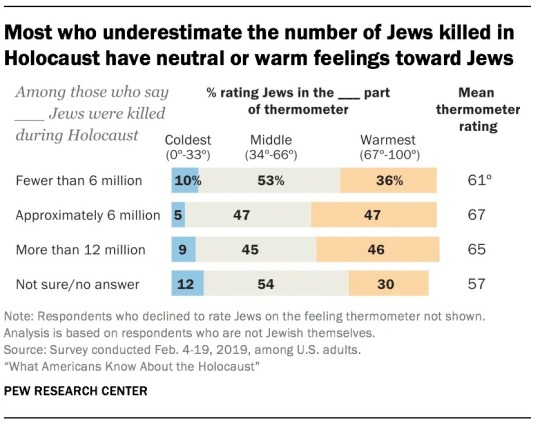
Most who underestimate the number of Jews killed in Holocaust have neutral or warm feelings toward Jews.
But it's not just ignorance; there's an entire industry that has been propped up and dedicated to Holocaust denial, complete with books, “movies,” and groups. To make matters worse, alarmingly, fewer Holocaust survivors are around to share their firsthand accounts and counteract the flames of denialism.
Nearly half of the 1000 people surveyed had stated that they’ve seen Holocaust denial or distortion posts on social media or elsewhere online.
I’ve always thought that denials of genocide—such as the Holocaust —were something that happened over time, with history slipping away and being re-written.
However, I never expected to be observing this in real time.
While initially the so-called “resistance” was celebrated by a subset of society, this soon turned into full-fledged denials of Hamas’ actions on Oct 7. Despite overwhelming evidence in the form of videos captured and shared by Hamas themselves and shared on Telegram channels and elsewhere, I would read and hear people claiming that they had only targeted Israeli military. Absurd claims emerged using supposedly ‘leaked’ footage where an Israeli helicopter shoots at Nova music festival goers. That video was viewed over 30 million times on X alone. The video, which was actually originally shared by the IDF on Oct 9, was showing their attacks on specific Gazan targets—certainly NOT indiscriminate bombings of music festival attendees in Israel. (Here’s a great thread that details how this piece of disinformation spread and geolocation information that further confirms that the claim is fake).
I’ve heard countless denials of the rapes of women (and men), despite overwhelming evidence in the form of physical evidence, forensics, and a number of witness testimonies. Women’s rights groups, meanwhile, remained silent—thus offering a vacuum for denialists to fill. Proponents of “me too” also stayed silent. Worse, the University of Alberta Sexual Assault Centre’s director signed an open letter calling Hamas perpetrating “sexual violence” an “unverified accusation.” It took UN Women nearly two months to issue a lukewarm condemnation of the brutal attacks. “We are alarmed by the numerous accounts of gender-based atrocities and sexual violence during those attacks,” they wrote, following a letter writing campaign urging them to speak up. Better late than never though, right?
The roughly 40 dead babies claim was debunked as a lie. At least that’s what people on social media now declare as fact, citing a Haaretz investigation.
“Haaretz investigation EXPOSES all the ISRAELI LIES from October 7th just like I predicated (sic),” reads the post of one particularly large disinformation account.
These claims persisted despite Haaretz directly addressing that post and calling it “blatant lies” and insisting that it “absolutely no basis in Haaretz’s reporting.”
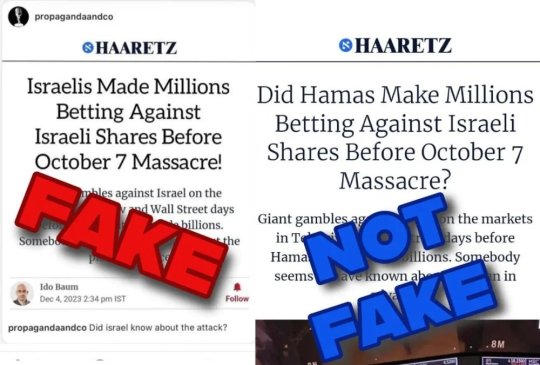
The denials continued regardless of the fact that a group of 200 forensic pathologists from all over the world had confirmed that babies were indeed murdered and that some babies were found decapitated, though it was unclear whether this was done before or after death. First responders also corroborated that they witnessed beheaded infants. Regardless of decapitation, these were babies, murdered.
The forensic pathologists also confirmed that humans were executed, bound and burned alive. Israeli police have over 1,000 statements related to the attack.
When some of the hostages were released, Hamas supporters claimed that the hostages enjoyed being held by them, that they hardly wanted to leave. That this was like a pleasant vacation for them, that’s all. Like sipping piña coladas by the beach. In fact, they would state that they were more concerned about their safety in Israeli hands. They even concocted stories of love affairs between a hostage who was shot in the leg and a Hamas captor. A sick and twisted take on reality where up is down, cats are dogs, and denial is truth. They dismissed the reality that many of these hostages watched their loved ones get murdered in front of them, and still had relatives being held in captivity. The hostages were also administered Clonazepam by Hamas, a mood-enhancing tranquilizing drug, before handing them over to the Red Cross, so that they would appear “happy.”
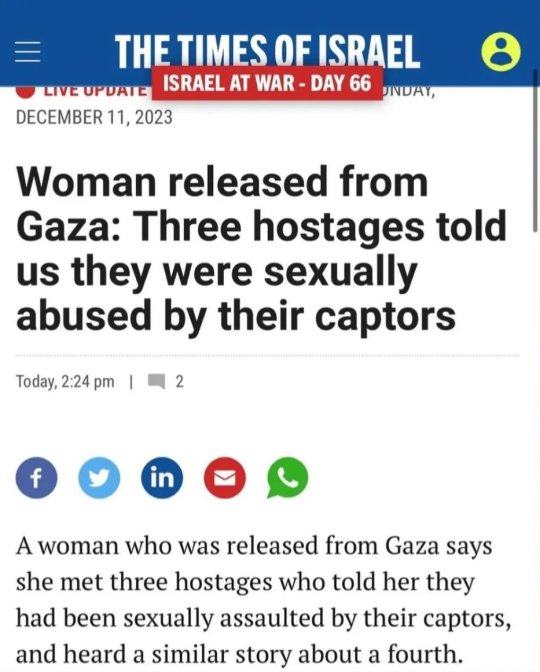
Meanwhile, the Yale Daily News published a correction of an opinion column stating that the “allegations had not been substantiated.”
The denials go on and on, and I can’t help but feel like I’m watching a version of Holocaust denial, except this time it’s happening in real time—not years after the fact. And this time, it has a Wi-Fi connection and a social media account.
The conditions for this were ripe. Moral relativism is why just several weeks ago, Gen Z embraced Bin Laden's 'Letter to America.' It has been building up for years across college campuses, a breeding ground for ideologies that support violent means to achieve political gains.
The perceived power dynamics play a role here too. In the eyes of many, the Israelis are seen as a superpower whereas the Palestinians, and by extension Hamas, are seen as underdogs. In their view, the underdog is always right because it is the victim, and the “power” is the oppressor. So how can the oppressor be a victim?
Israelis, despite the majority of the population being Mizrahi Jews, as well as 20% Arabs (who were also victims on Oct 7), have been framed as “white colonizers,” vs the Palestinians who are seen as “POC” in the context of this conflict. Never mind that Jews, including Ashkenazi Jews, can be traced back to the land through DNA, archaeological evidence, and historical documents.
An overall distrust for media is another factor, which has resulted in individuals taking the word of random influencer accounts as gospel over traditional media outlets. According to Gallup polls, Americans’ trust in media is near a record low. Only 34% of US adults have a “great deal” or “fair amount” of confidence as of 2022. This is a major hindrance to our sensemaking abilities.
And then, of course, there’s cognitive dissonance. When a group identifies so closely with the perpetrator and they commit heinous acts, confronting that fact happens to be uncomfortable. So, in an attempt to reduce that discomfort, they rationalize or deny the evidence. This means that they accept only evidence that supports their existing beliefs, while placing unreasonable demands on the other side.
But none of these factors would have gained as much traction if it weren’t for something that didn’t exist during the Holocaust: social media. This is the engine that helps drives this real-time historical revisionism and denialism. According to 2021 data from Pew Research, over 70% of Americans get their news via social platforms. A Reuters Institute report from 2023 found that 30% of respondents use social media as the main way to get their news.
We have a society that consumes sound-bites of information, both truth and lies (as well as lies based on grains of truth).
Social media algorithms—combined with human nature—tend to amplify outrageous untruths, which spread widely. Corrections, never make it as far as the original lie. They are just a faint hum.
Throughout the Israeli-Gaza war, we’ve seen AI generated images and bots used to paint a specific narrative—for evocative, emotional effect. But technologically sophisticatication isn’t a prerequisite for painting false narratives. Many “influencers” have taken to using existing images or videos and attaching misleading headlines to them—including sharing content that captures events in Syria while presenting it as taking place in Gaza. These networks of influencers have large reach, and can turn even the most blatant lie into a revisionist truth.
Researchers for Freedom House, a non-profit human right advocacy group, found that generally at least 47 governments have used commentators to manipulate online discussions in their favor, either via humans or bots. They’ve also recruited influencers to help spread false and misleading content, and have created fake websites that mimic actual media publications. Then there’s always Russia’s propaganda arm RT, and various other publications like Al Jazeera and Quds who have direct ties to Hamas and/or other Islamic regimes.
All of this has contributed to narrative confusion, and the erasure of unspeakable acts of brutality, and the denial of the facts of October 7, right before our very eyes.
If we cannot even share a common reality, how can have any hope of resolving anything?
“Never again” is happening now."
316 notes
·
View notes
Text


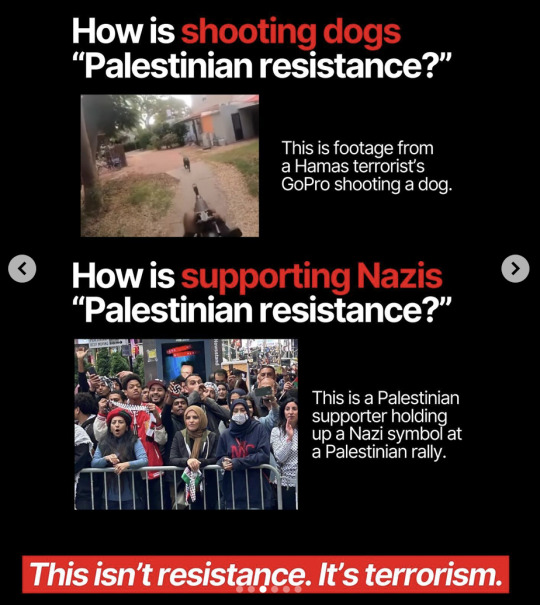
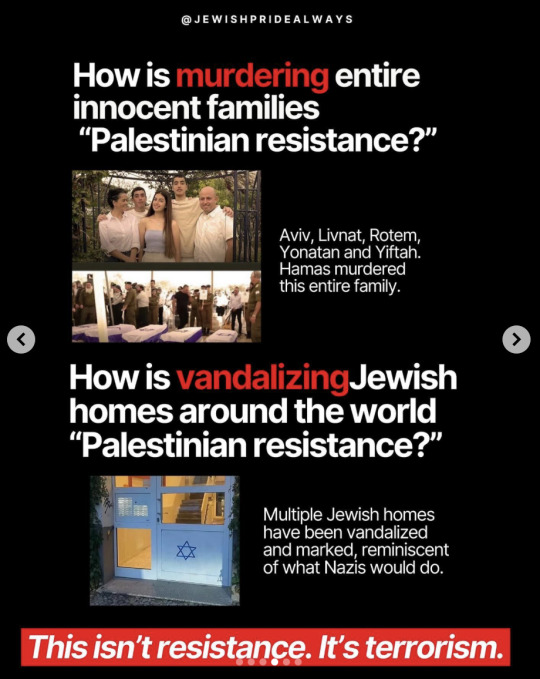
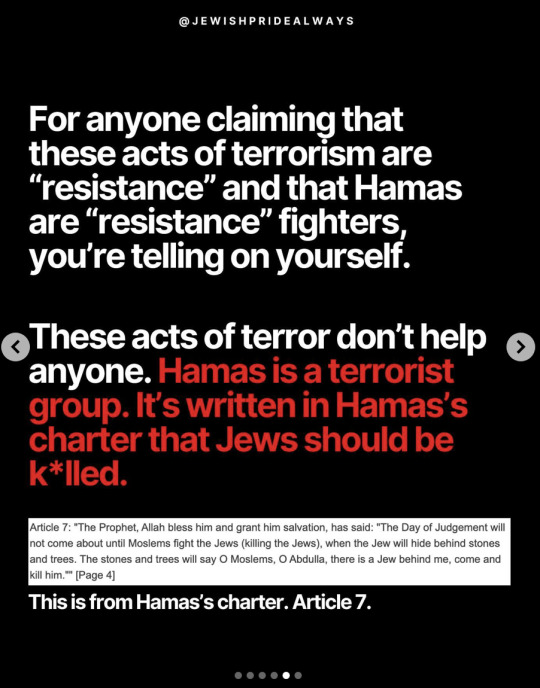

TERRORISM IS NOT RESISTANCE. For anyone claiming that acts of terrorism are “resistance” and that Hamas are “resistance” fighters, you’re telling on yourself. Hamas is a terrorist group and it’s written in Hamas’s charter that Jews should be k*lled.
Also, the Jewish people are indigenous to the Land of Israel and have a right to the Land. Anyone denying that is denying basic facts and history.
jewishpridealways
138 notes
·
View notes
Text
Meet Edgar Morin - a 102-year-old Jewish veteran of the French Resistance, a renowned philosopher, and a strident voice for justice. It truly upsets me that I’d never heard of this incredible man till now.
“I am both astonished and outraged by the fact that those who represent the descendants of a people who were persecuted for centuries for religious or racial reasons... That the descendants of this people who are today the decision-makers of the State of Israel, could not only colonize an entire people, partly drive them out of their land and seek to expel them for good... But also, after the massacre of October 7, engage in a real massive slaughter on the population of Gaza and continue, incessantly, hitting civilians, women, and children.
And to see the silence of the world, the silence of the United States, protectors of Israel, the silence of the Arab states, the silence of the European states who claim to be defenders of culture, humanity, human rights.
I think we are living through a horrible tragedy because we are also powerless in the face of this thing that is unleashing. At least, I say: bear witness! The only thing that remains if we cannot resist concretely is to TESTIFY. Let’s RESIST IN OUR MINDS, let’s not be fooled, let’s not forget, let’s have the courage to face things head-on.”
Repost from @middleeasteye
“After the massacre of 7 October, (Israel) engaged in a real massive slaughter on the populations of Gaza.”
French philosopher Edgar Morin, a Jewish WWII resistance fighter, criticised Israel’s actions in Gaza. He expressed disappointment at the silence of countries like the United States, Arab and European nations, whom he referred to as “protectors” of Israel.
#jewsforpalestine #jewsagainstzionism #gaza #gazagenocide #humanrights #palestine #freepalestine #freegaza #freethewestbank #israel #crimesagainsthumanity #antifascist #solidarity #ceasefirenow #neveragain #neveragainisnow
#free palestine#palestine#human rights#Gaza#jews for palestine#edgar morin#gaza genocide#jews for ceasefire#jewish antizionism#antizionist jews#resistance#save gaza#free gaza#french resistance#judaism#never again#never again for anyone#never again is now#ceasefire now#stop the genocide
278 notes
·
View notes
Photo
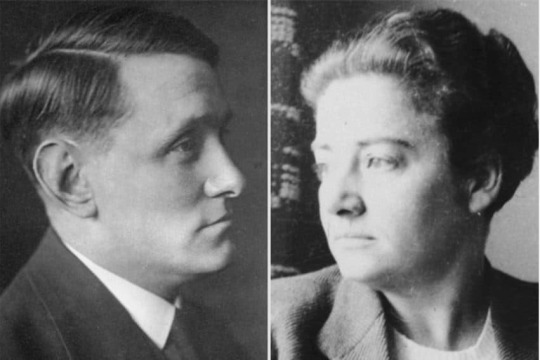
On this day, 27 March 1943, gay anti-fascist resistance fighter Willem Arondeus led a group in bombing the Amsterdam Public Records Office which the Nazis had used to identify Jewish people and verify documents. At around 10:15 PM, the group of around 10 people wearing police uniforms overpowered guards, sedated them and dragged them to the garden. Five explosions were then heard and the building was set ablaze. Firefighters then deliberately waited a long time before attempting to put out the fire, and when doing so they used large amounts of water, presumably in order to damage more papers. The attack destroyed thousands of files which could be used to check if documents forged by the resistance were genuine or not. Within a week, Arondeus (pictured, left) and the other members of the group were arrested. One of the participants, Frieda Belinfante (right), a musician and lesbian, managed to evade capture. Twelve, including Arondeus, were executed that July by firing squad. In his last message before his execution, Arondeus said, "Let it be known that homosexuals are not cowards." More information, sources and map: https://stories.workingclasshistory.com/article/9931/amsterdam-population-registry-destroyed https://www.facebook.com/workingclasshistory/photos/a.296224173896073/2238500086335129/?type=3
927 notes
·
View notes
Text
essential reading.
Opinion - There is a Jewish Hope for Palestinian Liberation. It Must Survive. - by Peter Beinart
And perhaps one day, when it finally becomes hideously clear that Hamas cannot free Palestinians by murdering children and Israel cannot subdue Gaza, even by razing it to the ground, those communities may become the germ of a mass movement for freedom that astonishes the world, as Black and white South Africans did decades ago. I’m confident I won’t live to see it. No gambler would stake a bet on it happening at all. But what’s the alternative, for those of us whose lives and histories are bound up with that small, ghastly, sacred place?
"In 1988, bombs exploded at restaurants, sporting events and arcades in South Africa. In response, the African National Congress, then in its 77th year of a struggle to overthrow white domination, did something remarkable: It accepted responsibility and pledged to prevent its fighters from conducting such operations in the future. Its logic was straightforward: Targeting civilians is wrong. “Our morality as revolutionaries,” the A.N.C. declared, “dictates that we respect the values underpinning the humane conduct of war.”
Historically, geographically and morally, the A.N.C. of 1988 is a universe away from the Hamas of 2023, so remote that its behavior may seem irrelevant to the horror that Hamas unleashed last weekend in southern Israel. But South Africa offers a counter-history, a glimpse into how ethical resistance works and how it can succeed. It offers not an instruction manual, but a place — in this season of agony and rage — to look for hope.
There was nothing inevitable about the A.N.C.’s policy, which, as Jeff Goodwin, a New York University sociologist, has documented, helped ensure that there was “so little terrorism in the anti-apartheid struggle.” So why didn’t the A.N.C. carry out the kind of gruesome massacres for which Hamas has become notorious? There’s no simple answer. But two factors are clear. First, the A.N.C.’s strategy for fighting apartheid was intimately linked to its vision of what should follow apartheid. It refused to terrify and traumatize white South Africans because it wasn’t trying to force them out. It was trying to win them over to a vision of a multiracial democracy.
ADVERTISEMENT
Second, the A.N.C. found it easier to maintain moral discipline — which required it to focus on popular, nonviolent resistance and use force only against military installations and industrial sites — because its strategy was showing signs of success. By 1988, when the A.N.C. expressed regret for killing civilians, more than 150 American universities had at least partially divested from companies doing business in South Africa, and the United States Congress had imposed sanctions on the apartheid regime. The result was a virtuous cycle: Ethical resistance elicited international support, and international support made ethical resistance easier to sustain.
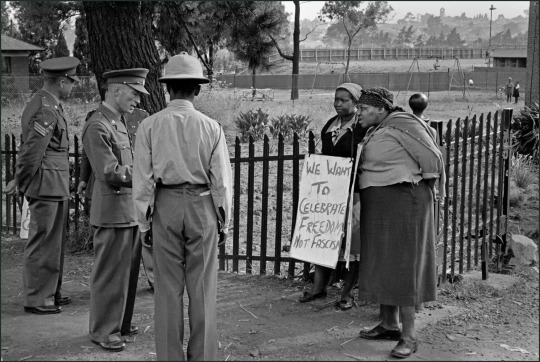
In Israel today, the dynamic is almost exactly the opposite. Hamas, whose authoritarian, theocratic ideology could not be farther from the A.N.C.’s, has committed an unspeakable horror that may damage the Palestinian cause for decades to come. Yet when Palestinians resist their oppression in ethical ways — by calling for boycotts, sanctions and the application of international law — the United States and its allies work to ensure that those efforts fail, which convinces many Palestinians that ethical resistance doesn’t work, which empowers Hamas.
The savagery Hamas committed on Oct. 7 has made reversing this monstrous cycle much harder. It could take a generation. It will require a shared commitment to ending Palestinian oppression in ways that respect the infinite value of every human life. It will require Palestinians to forcefully oppose attacks on Jewish civilians, and Jews to support Palestinians when they resist oppression in humane ways — even though Palestinians and Jews who take such steps will risk making themselves pariahs among their own people. It will require new forms of political community, in Israel-Palestine and around the world, built around a democratic vision powerful enough to transcend tribal divides. The effort may fail. It has failed before. The alternative is to descend, flags waving, into hell.
As Jewish Israelis bury their dead and recite psalms for their captured, few want to hear at this moment that millions of Palestinians lack basic human rights. Neither do many Jews abroad. I understand; this attack has awakened the deepest traumas of our badly scarred people. But the truth remains: The denial of Palestinian freedom sits at the heart of this conflict, which began long before Hamas’s creation in the late 1980s.
Most of Gaza’s residents aren’t from Gaza. They’re the descendants of refugees who were expelled, or fled in fear, during Israel’s war of independence in 1948. They live in what Human Rights Watch has called an “open-air prison,” penned in by an Israeli state that — with help from Egypt — rations everything that goes in and out, from tomatoes to the travel documents children need to get lifesaving medical care. From this overcrowded cage, which the United Nations in 2017 declared “unlivable” for many residents in part because it lacks electricity and clean water, many Palestinians in Gaza can see the land that their parents and grandparents called home, though most may never step foot in it.
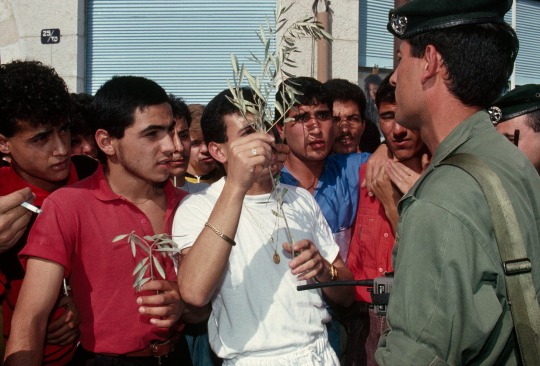
Palestinians in the West Bank are only slightly better off. For more than half a century, they have lived without due process, free movement, citizenship or the ability to vote for the government that controls their lives. Defenseless against an Israeli government that includes ministers openly committed to ethnic cleansing, many are being driven from their homes in what Palestinians compare to the mass expulsions of 1948. Americans and Israeli Jews have the luxury of ignoring these harsh realities. Palestinians do not. Indeed, the commander of Hamas’s military wing cited attacks on Palestinians in the West Bank in justifying its barbarism last weekend.
Just as Black South Africans resisted apartheid, Palestinians resist a system that has earned the same designation from the world’s leading human rights organizations and Israel’s own. After last weekend, some critics may claim Palestinians are incapable of resisting in ethical ways. But that’s not true. In 1936, during the British mandate, Palestinians began what some consider the longest anticolonial general strike in history. In 1976, on what became known as Land Day, thousands of Palestinian citizens demonstrated against the Israeli government’s seizure of Palestinian property in Israel’s north. The first intifada against Israel’s occupation of the West Bank and the Gaza Strip, which lasted from roughly 1987 to 1993, consisted primarily of nonviolent boycotts of Israeli goods and a refusal to pay Israeli taxes. While some Palestinians threw stones and Molotov cocktails, armed attacks were rare, even in the face of an Israeli crackdown that took more than 1,000 Palestinian lives. In 2005, 173 Palestinian civil society organizations asked “people of conscience all over the world to impose broad boycotts and implement divestment initiatives against Israel similar to those applied to South Africa in the apartheid era.”
But in the United States, Palestinians received little credit for trying to follow Black South Africans’ largely nonviolent path. Instead, the Boycott, Divestment and Sanctions movement’s call for full equality, including the right of Palestinian refugees to return home, was widely deemed antisemitic because it conflicts with the idea of a state that favors Jews.
It is true that these nonviolent efforts sit uncomfortably alongside an ugly history of civilian massacres: the murder of 67 Jews in Hebron in 1929 by local Palestinians after Haj Amin al-Husseini, the grand mufti of Jerusalem, claimed Jews were about to seize Al Aqsa Mosque; the airplane hijackings of the late 1960s and 1970s carried out primarily by the leftist Popular Front for the Liberation of Palestine and Yasir Arafat’s nationalist Fatah faction; the 1972 assassination of Israeli athletes in Munich carried out by the Palestinian organization Black September; and the suicide bombings of the 1990s and 2000s conducted by Hamas, Palestinian Islamic Jihad and Fatah’s Aqsa Martyrs Brigades, whose victims included a friend of mine in rabbinical school who I dreamed might one day officiate my wedding.
And yet it is essential to remember that some Palestinians courageously condemned this inhuman violence. In 1979, Edward Said, the famed literary critic, declared himself “horrified at the hijacking of planes, the suicidal missions, the assassinations, the bombing of schools and hotels.” Rashid Khalidi, a Palestinian American historian, called the suicide bombings of the second intifada “a war crime.” After Hamas’s attack last weekend, a member of the Israeli parliament, Ayman Odeh, among the most prominent leaders of Israel’s Palestinian citizens, declared, “It is absolutely forbidden to accept any attacks on the innocent.”Tragically, this vision of ethical resistance is being repudiated by some pro-Palestinian activists in the United States. In a statement last week, National Students for Justice in Palestine, which represents more than 250 Palestinian solidarity groups in North America, called Hamas’s attack “a historic win for the Palestinian resistance” that proves that “total return and liberation to Palestine is near” and added, “from Rhodesia to South Africa to Algeria, no settler colony can hold out forever.” One of its posters featured a paraglider that some Hamas fighters used to enter Israel.
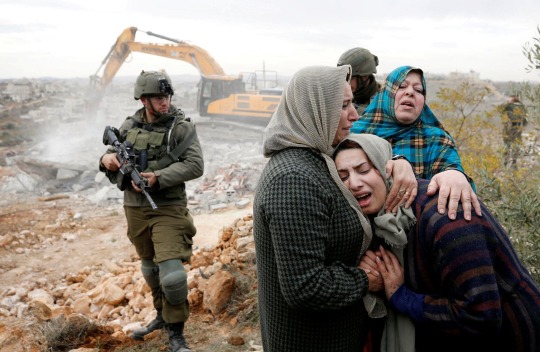
The reference to Algeria reveals the delusion underlying this celebration of abduction and murder. After eight years of hideous war, Algeria’s settlers returned to France. But there will be no Algerian solution in Israel-Palestine. Israel is too militarily powerful to be conquered. More fundamentally, Israeli Jews have no home country to which to return. They are already home.
Mr. Said understood this. “The Israeli Jew is there in the Middle East,” he advised Palestinians in 1974, “and we cannot, I might even say that we must not, pretend that he will not be there tomorrow, after the struggle is over.” The Jewish “attachment to the land,” he added, “is something we must face.” Because Mr. Said saw Israeli Jews as something other than mere colonizers, he understood the futility — as well as the immorality — of trying to terrorize them into flight.
The failure of Hamas and its American defenders to recognize that will make it much harder for Jews and Palestinians to resist together in ethical ways. Before last Saturday, it was possible, with some imagination, to envision a joint Palestinian-Jewish struggle for the mutual liberation of both peoples. There were glimmers in the protest movement against Benjamin Netanyahu’s judicial overhaul, through which more and more Israeli Jews grasped a connection between the denial of rights to Palestinians and the assault on their own. And there were signs in the United States, where almost 40 percent of American Jews under the age of 40 told the Jewish Electoral Institute in 2021 that they considered Israel an apartheid state. More Jews in the United States, and even Israel, were beginning to see Palestinian liberation as a form of Jewish liberation as well.
That potential alliance has now been gravely damaged. There are many Jews willing to join Palestinians in a movement to end apartheid, even if doing so alienates us from our communities, and in some cases, our families. But we will not lock arms with people who cheer the kidnapping or murder of a Jewish child.
The struggle to persuade Palestinian activists to repudiate Hamas’s crimes, affirm a vision of mutual coexistence and continue the spirit of Mr. Said and the A.N.C. will be waged inside the Palestinian camp. The role of non-Palestinians is different: to help create the conditions that allow ethical resistance to succeed.
Palestinians are not fundamentally different from other people facing oppression: When moral resistance doesn’t work, they try something else. In 1972, the Northern Ireland Civil Rights Association, which was modeled on the civil rights movement in the United States, organized a march to oppose imprisonment without trial. Although some organizations, most notably the Provisional Irish Republican Army, had already embraced armed resistance, they grew stronger after British soldiers shot 26 unarmed civilians in what became known as Bloody Sunday. By the early 1980s, the Irish Republican Army had even detonated a bomb outside Harrods, the department store in London. As Kirssa Cline Ryckman, a political scientist, observed in a 2019 paper on why certain movements turn violent, a lack of progress in peaceful protest “can encourage the use of violence by convincing demonstrators that nonviolence will fail to achieve meaningful concessions.”
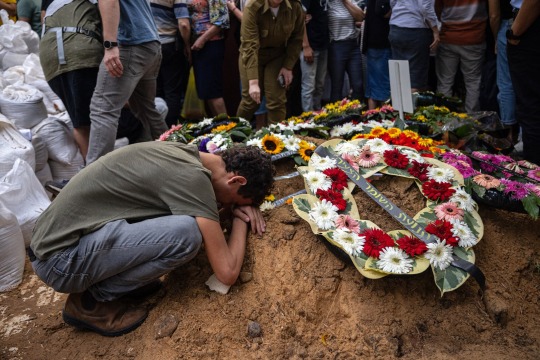
Israel, with America’s help, has done exactly that. It has repeatedly undermined Palestinians who sought to end Israel’s occupation through negotiations or nonviolent pressure. As part of the 1993 Oslo Accords, the Palestine Liberation Organization renounced violence and began working with Israel — albeit imperfectly — to prevent attacks on Israelis, something that revolutionary groups like the A.N.C. and the Irish Republican Army never did while their people remained under oppression. At first, as Khalil Shikaki, a Palestinian political scientist, has detailed, Palestinians supported cooperation with Israel because they thought it would deliver them a state. In early 1996, Palestinian support for the Oslo process reached 80 percent while support for violence against Israelis dropped to 20 percent.
The 1996 election of Benjamin Netanyahu, and the failure of Israel and its American patron to stop settlement growth, however, curdled Palestinian sentiment. Many Jewish Israelis believe that Ehud Barak, who succeeded Mr. Netanyahu, offered Palestinians a generous deal in 2000. Most Palestinians, however, saw Mr. Barak’s offer as falling far short of a fully sovereign state along the 1967 lines. And their disillusionment with a peace process that allowed Israel to entrench its hold over the territory on which they hoped to build their new country ushered in the violence of the second intifada. In Mr. Shikaki’s words, “The loss of confidence in the ability of the peace process to deliver a permanent agreement on acceptable terms had a dramatic impact on the level of Palestinian support for violence against Israelis.” As Palestinians abandoned hope, Hamas gained power.
After the brutal years of the second intifada, in which Hamas and other Palestinian armed groups repeatedly targeted Israeli civilians, President Mahmoud Abbas of the Palestinian Authority and Salam Fayyad, his prime minister from 2007 to 2013, worked to restore security cooperation and prevent anti-Israeli violence once again. Yet again, the strategy failed. The same Israeli leaders who applauded Mr. Fayyad undermined him in back rooms by funding the settlement growth that convinced Palestinians that security cooperation was bringing them only deepening occupation. Mr. Fayyad, in an interview with The Times’s Roger Cohen before he left office in 2013, admitted that because the “occupation regime is more entrenched,” Palestinians “question whether the P.A. can deliver. Meanwhile, Hamas gains recognition and is strengthened.”
As Palestinians lost faith that cooperation with Israel could end the occupation, many appealed to the world to hold Israel accountable for its violation of their rights. In response, both Democratic and Republican presidents have worked diligently to ensure that these nonviolent efforts fail. Since 1997, the United States has vetoed more than a dozen United Nations Security Council resolutions criticizing Israel for its actions in the West Bank and Gaza. This February, even as Israel’s far-right government was beginning a huge settlement expansion, the Biden administration reportedly wielded a veto threat to drastically dilute a Security Council resolution that would have condemned settlement growth.
Washington’s response to the International Criminal Court’s efforts to investigate potential Israeli war crimes is equally hostile. Despite lifting sanctions that the Trump administration imposed on I.C.C. officials investigating the United States’s conduct in Afghanistan, the Biden team remains adamantly opposed to any I.C.C. investigation into Israel’s actions.
The Boycott, Divestment and Sanctions movement, or B.D.S., which was founded in 2005 as a nonviolent alternative to the murderous second intifada and which speaks in the language of human rights and international law, has been similarly stymied, including by many of the same American politicians who celebrated the movement to boycott, divest from and sanction South Africa. Joe Biden, who is proud of his role in passing sanctions against South Africa, has condemned the B.D.S. movement, saying it “too often veers into antisemitism.” About 35 states — some of which once divested state funds from companies doing business in apartheid South Africa — have passed laws or issued executive orders punishing companies that boycott Israel. In many cases, those punishments apply even to businesses that boycott only Israeli settlements in the West Bank.
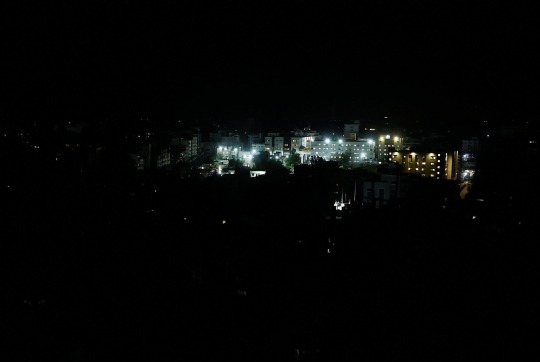
Palestinians have noticed. In the words of Dana El Kurd, a Palestinian American political scientist, “Palestinians have lost faith in the efficacy of nonviolent protest as well as the possible role of the international community.” Mohammed Deif, the commander of Hamas’s military wing, cited this disillusionment during last Saturday’s attack. “In light of the orgy of occupation and its denial of international laws and resolutions, and in light of American and Western support and international silence,” he declared, “we’ve decided to put an end to all this.”
Hamas — and no one else — bears the blame for its sadistic violence. But it can carry out such violence more easily, and with less backlash from ordinary Palestinians, because even many Palestinians who loathe the organization have lost hope that moral strategies can succeed. By treating Israel radically differently from how the United States treated South Africa in the 1980s, American politicians have made it harder for Palestinians to follow the A.N.C.’s ethical path. The Americans who claim to hate Hamas the most have empowered it again and again.
Israelis have just witnessed the greatest one-day loss of Jewish life since the Holocaust. For Palestinians, especially in Gaza, where Israel has now ordered more than one million people in the north to leave their homes, the days to come are likely to bring dislocation and death on a scale that should haunt the conscience of the world. Never in my lifetime have the prospects for justice and peace looked more remote. Yet the work of moral rebuilding must begin. In Israel-Palestine and around the world, pockets of Palestinians and Jews, aided by people of conscience of all backgrounds, must slowly construct networks of trust based on the simple principle that the lives of both Palestinians and Jews are precious and inextricably intertwined.
Israel desperately needs a genuinely Jewish and Palestinian political party, not because it can win power but because it can model a politics based on common liberal democratic values, not tribe. American Jews who rightly hate Hamas but know, in their bones, that Israel’s treatment of Palestinians is profoundly wrong must ask themselves a painful question: What nonviolent forms of Palestinian resistance to oppression will I support? More Palestinians and their supporters must express revulsion at the murder of innocent Israeli Jews and affirm that Palestinian liberation means living equally alongside them in safety and freedom.
From those reckonings, small, beloved communities can be born, and grow. And perhaps one day, when it finally becomes hideously clear that Hamas cannot free Palestinians by murdering children and Israel cannot subdue Gaza, even by razing it to the ground, those communities may become the germ of a mass movement for freedom that astonishes the world, as Black and white South Africans did decades ago. I’m confident I won’t live to see it. No gambler would stake a bet on it happening at all. But what’s the alternative, for those of us whose lives and histories are bound up with that small, ghastly, sacred place?
Like many others who care about the lives of both Palestinians and Jews, I have felt in recent days the greatest despair I have ever known. On Wednesday, a Palestinian friend sent me a note of consolation. She ended it with the words “only together.” Maybe that can be our motto.
#articles#definitely one of the best most extensive most personal most meaningful articles i've read this week#also addresses a LOT of uh. talking points recently
289 notes
·
View notes